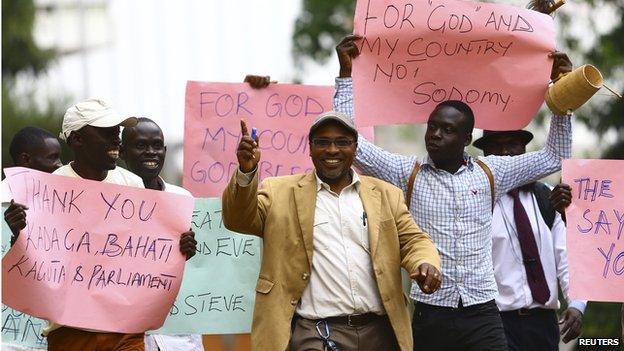Uganda says healthcare is for all despite anti-gay law
- Published
Dr Ruhakana Rugunda told the BBC that all people, gay or otherwise, should get full access to medical treatment
Uganda's health minister says homosexuals will not be discriminated against when accessing healthcare despite the introduction of a tough new anti-gay law.
Dr Ruhakana Rugunda told the BBC that all people, gay or otherwise, should get full access to medical treatment.
Aid charities warn the new bill will have "disastrous" effects on the country's response to HIV.
Uganda is a very conservative society where many people oppose homosexuality.
Homosexual acts were already illegal in Uganda, but the new law bans the promotion of homosexuality and covers lesbians for the first time.
Western governments have condemned President Yoweri Museveni's decision to approve the bill, which gives life sentences for gay sex and same-sex marriage.
Promises of confidentiality

Anti-gay supporters celebrated the passing of the new anti-gay law on Monday
The Ugandan authorities sought to give assurances on Tuesday, after several Western nations condemned the signing of the tough new anti-gay law.
Mr Rugunda urged gay people to be honest with healthcare workers, particularly when discussing treatment for HIV.
"All people whether they are sexual orientation as gays or otherwise are at complete liberty to get full treatment and to give full disclosure to their doctors and nurses," he told the BBC.
He adds: "And by the way, health workers will live up to their ethics of keeping confidentiality of their patients."
Western governments have threatened to withdraw international aid to Uganda, which the country's fragile health system relies heavily on, says the BBC's Tulip Mazumdar.
Uganda receives a reported $400m (£240m) in annual aid from the US, which has begun to review its assistance programmes in Uganda in the wake of the passing of the new law.
But Dr Rugunda said he was confident the US would not restrict funds and said if it does, Uganda would cope.
US Secretary of State John Kerry said Mr Museveni's decision to sign the bill marked a "tragic day for Uganda and for all who care about the cause of human rights".
But the Ugandan authorities have defended the decision, saying President Museveni wanted "to demonstrate Uganda's independence in the face of Western pressure and provocation".
The sponsor of the bill, MP David Bahati, insisted homosexuality was a "behaviour that can be learned and can be unlearned".
There are already concerns of a witch-hunt against gay people in Uganda after popular tabloid Red Pepper published on Tuesday a list of the country's "200 top homosexuals" under the headline: "Exposed".
In 2011, a Ugandan gay activist was killed after his name appeared in a similar list published by the now-defunct Ugandan Rolling Stone magazine, calling for the execution of gay people.
Sweden says it might withdraw direct aid to Uganda, worth about $10.8m and the Netherlands has already stopped a $9.6m subsidy to Uganda's judicial system.
Norway and Denmark said they would transfer direct aid - together totalling about $17m - to non-governmental organisations.
- Published24 February 2014
- Published10 February 2014
- Published18 February 2014
- Published24 January 2014
- Published7 December 2011